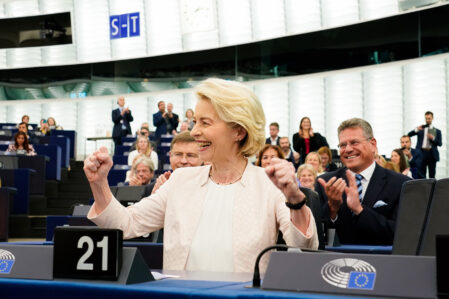July 2024
EU Elections Update: Von der Leyen’s Reelection Sparks New Dynamics in European Parliament
Region: Uncategorized
Author: Elise Cadot
The process leading to her reelection involved a series of bilateral meetings and negotiations with numerous Members of the European Parliament (MEPs). In her bid to secure votes, she made various policy promises, including the creation of new commissioners focused on defense, housing, fisheries, and the Mediterranean region.
This update follows on from our earlier piece about the European elections as of June 2024.
The recent European elections in early June and the subsequent reshuffling of key EU institutional positions have set the stage for intense negotiations and political maneuvering. Following Roberta Metsola’s expected reelection as President of the European Parliament, Ursula von der Leyen has secured a new mandate as President of the European Commission on July 18, marking a continuation of leadership at the EU’s executive branch.
Von der Leyen’s promises secure reelection
In a decisive vote, Ursula von der Leyen won 401 votes in a secret ballot, significantly surpassing the required 361 votes needed for reelection. This outcome was achieved through a coalition of support from the European People’s Party (EPP), the Progressive Alliance of Socialists and Democrats (S&D), and Renew Europe. Von der Leyen also had to reach beyond this core alliance, particularly to the Greens. The European Conservatives and Reformists (ECR) group withheld their support.
The process leading to her reelection involved a series of bilateral meetings and negotiations with numerous Members of the European Parliament (MEPs). In her bid to secure votes, she made various policy promises, including the creation of new commissioners focused on defense, housing, fisheries, and the Mediterranean region.
Von der Leyen’s political guidelines, published shortly before her speech to the EP, reflect a delicate balancing act. She emphasized competitiveness as a primary policy priority for her potential second term, while also pledging to expand the European Green Deal with an ambitious 2040 climate target.
The «cordon sanitaire» and far-right representation
Despite the rightward shift of the European Parliament since June, pro-European political groups are actively working together to prevent the 187 far-right MEPs from obtaining key positions. This strategy, known as the «cordon sanitaire,» aims to isolate and reduce the influence of the far-right. Critics argue that this approach is undemocratic and creates potential risks for the future, as excluding duly elected representatives from significant roles could backfire with those MEPs’ voters.
Currently, far-right MEPs are divided into three distinct groups: the European Conservatives and Reformists (ECR), and the newly formed «Patriots for Europe» and “Europe of Sovereign Nations” group. The Patriots, led by Jordan Bardella from the French National Rally and created by Hungarian Prime Minister Viktor Orban, have emerged as the third-largest group in the EP. Meanwhile, the Sovereign Nations are centered around Germany’s AfD. The cordon sanitaire has effectively barred both newly formed groups from obtaining any vice-presidencies or key committee roles. For instance, the other groups prevented the Patriots from obtaining the chairmanship of the Transport and Culture Committees that had provisionally attributed to the far-right grouping based on their number of seats after the June election.
Interestingly, the cordon sanitaire is not uniformly applied to all far-right groups. The ECR, which includes Giorgia Meloni’s far-right Brothers of Italy, secured two vice-presidencies, one more than in the previous term. In addition, the ECR obtained two presidencies of committees (the Committee on Agriculture and the one on Budgets). This inconsistency suggests a variable application of the cordon sanitaire, influenced by political alliances and voting behaviors. For instance, the EPP teamed up with the ECR to vote against climate regulations in the previous mandate.
The Road Ahead: Forming the New Commission
With von der Leyen’s reelection secured, her next challenge lies in the composition of the College of Commissioners, a task described by insiders as a «political mess.» She must navigate the complexities of ensuring gender, political, and geographical balance within her team. Additionally, von der Leyen will face resistance from EU leaders who are wary of her accumulating too much power as she assembles her new team.
To streamline the process, she has urged Member States to submit their candidate Commissioners’ names as soon as possible, with the intention of starting hearings in mid-August. The official presentation of the College of Commissioners, including the allocation of portfolios, is anticipated in September. Each Commissioner candidate will then undergo individual hearings and approval by MEPs, culminating in a formal plenary vote in October or November to ratify the new Commission.
This period will be critical for von der Leyen as she strives to form a balanced and effective team capable of addressing the myriad challenges facing the European Union. The upcoming months will test her ability to manage both internal and external pressures, ensuring that her second term begins on solid ground in an increasingly complex European political landscape.
